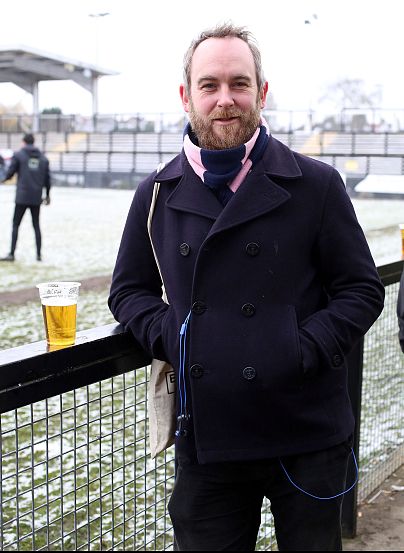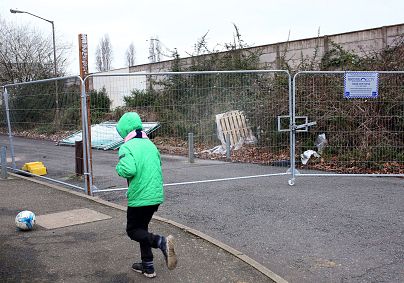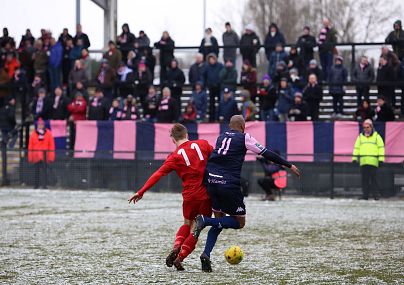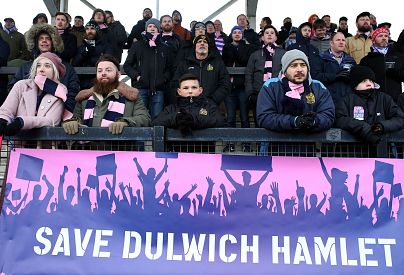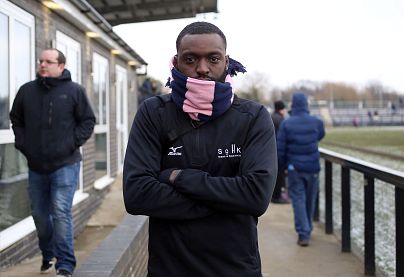Founded in 1893, the club gained a hipster cult following partly because of its staunch commitment to social justice off the field.
LONDON — A sea of blue and pink erupts as wide midfielder Nyren Clunis prods the ball into the net, scoring Dulwich Hamlet Football Club's third goal on this freezing, snow-flurried afternoon.
But for all the cheering and singing in the bleachers, the celebrations are bittersweet for this tiny football team based in southeast London.
The 125-year-old club's very existence is under threat from what it says is a bullying, multi-billion-dollar New York property company that wants to knock down its Champion Hill stadium to build apartments.
"If this club ceased to exist, it would be awful for the community and awful for the thousands of people who come down every week," says Paul Grocott, a 32-year-old fan who wears a backwoodsman's beard and sips a pale ale while waiting for his team to run out onto the snow-encrusted field.
"It would be another part of London that is having the community ripped out of it, which is happening all over the city," he says.
The past few months has been a time of deep turmoil for Dulwich.
The club finds itself at the center of an standoff between the local government and Meadow Residential, the London branch of midtown Manhattan-based Meadow Partners.
"Their behavior towards the club has been despicable"
The firm owns Dulwich's stadium and wants to build an £80 million ($113 million) development of 155 apartments on the site, while constructing a new stadium next door.
Southwark Council has blocked the proposal, however, because not enough of these homes are classed as "affordable housing," and the land earmarked by Meadow for a new stadium is protected green space.
Most fans initially backed the prospect of a more modern stadium. But Meadow provoked bitter discord earlier this month when it barred the club from using Champion Hill and announced it had trademarked the team's name.
For a time the club found itself homeless and nameless.
"Frankly I think they've tried to bully us," says Tom Cullen, one of Dulwich's directors. "This might work in New York property transactions but it's not how you deal with a much-loved, 125-year-old football club."
Peter John, the leader of Southwark Council, says the motivation behind Meadow's hardball moves is a clear attempt to use the club's future as a bargaining chip and force the development through.
"Since this turned sour last autumn their behavior towards the club has been despicable," he said. "This is a situation wholly of Meadow's creation … In this instance we are standing up to developers on behalf of the community."
Meadow denies these accusations.
The firm's London offices hasn't returned repeated calls and emails from NBC News requesting comment. But it did explain its actions in a press release issued on March 7.
It points out it saved Dulwich from the brink of insolvency in 2014 when it bought the stadium for a reported £5.7 million (around $8 million at today's exchange rates).
It also claims it has paid off £750,000 in debts.
"Meadow has been unable to financially support the club while Southwark Council is determined to prevent the stadium proposals from progressing," it said. "Meadow would never have committed such significant sums of money to support the club if it did not genuinely believe in its importance and value to the community."
To understand the situation Dulwich is in, it is first important to know what anyone and everyone involved with the club will tell you: This team is about so much more than football.
Founded in 1893, it has has gained a hipster cult following partly because of its staunch commitment to social justice off the field.
It has raised money and awareness for a host of causes, from local food banks and homeless charities to Syrian refugees and LGBT rights.
"It's part of the fabric of where we live," says Catherine Rose, a 47-year-old fan who is also a politician with the local government. "It's totemic because it's one of the oldest teams in the division. Its loss would be felt massively around here."
The football here isn't bad, either.
In recent days, the club has been allowed to use its name again and is now playing matches at the home of its fierce rivals, Tooting and Mitcham F.C.
Dulwich sits in first place in the Bostik League Premier Division, the seventh tier of English football.
The team typically attracts more than 2,000 people per game, far more than others playing at the same level.
The most ardent Dulwich supporters are known as The Rabble, a group that stands behind the opposition's goal and sing songs like: "No-one knows us! We don't care!"
Tony Emerson, a 72-year-old retired academic, says he feels an emotional bond with the team after his son, a major fan, died five years ago.
"It is more than just a football club; it's a means of identity locally," he says, nursing a polystyrene cup of piping-hot tea. "If that went away, there would be a big hole in my life and a hole in south London."
As much as it resonates in this local community, the Dulwich Hamlet story speaks to the wider issue of London's real estate market, where where prices have skyrocketed far beyond the reaches of ordinary workers, partly because not enough homes are being built.
Stadiums like Dulwich's are worth far more to developers than the clubs could ever generate.
Locals and fans argue the value of the team can't be judged in cash alone. But for all the talk of community spirit, it's also true that this area of south London has become synonymous with the type of gentrification that's seen so much of the capital, like many cities around the world, struggle with its changing identity.
For all this unrest, it seems that in recent days the balance of the negotiations has shifted in favor of the local government, and with it the club.
Southwark Council says it wants to buy the stadium at a fair price so it can build a smaller development of affordable, social housing. This would use only part of the site and allow the club to keep functioning.
If Meadow doesn't agree, the council has threatened a Compulsory Purchase Order, a legal mechanism in the U.K. that allows authorities to force the sale of property or land in special circumstances.
That's music to the ears of Jack Badu, a 28-year-old charity worker, who shivered with his girlfriend, freelance copywriter Emily Brown, during a recent game.
"If more clubs were like Dulwich the world would be a better place," according to Badu, only half smiling at this bold assessment of his club's importance.
Brown, 27, chimes in: "I've always liked football but obviously I'm a girl and you get teased quite a lot, but Dulwich is a very easy place to be. I've come to games on my own and I never thought I'd be able to do that."












